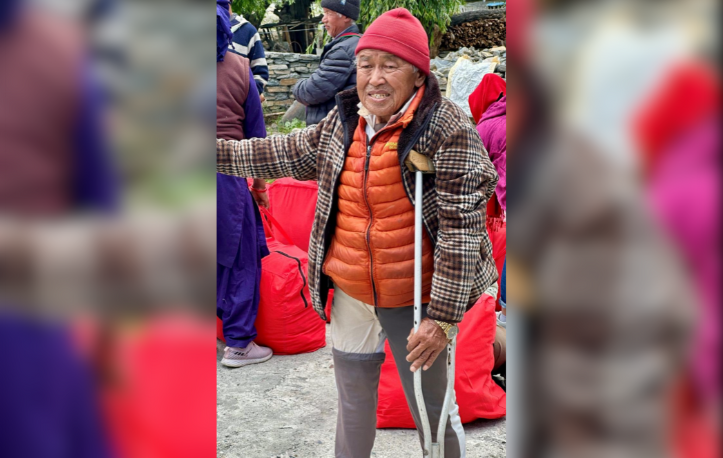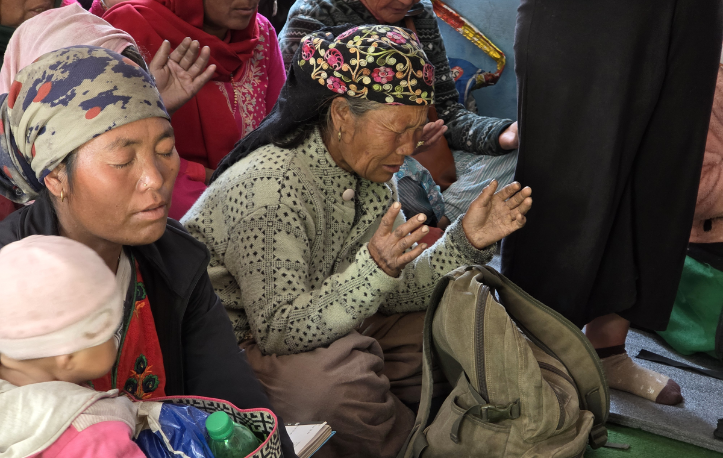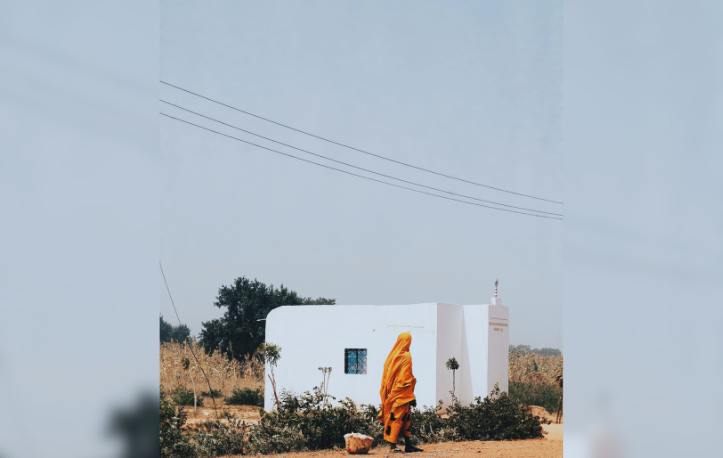For years, David wanted nothing more than to become a tailor. But soon after he achieved his goal, God gave him a bigger vision.
Having grown up as the son of a pastor, he suddenly felt led to enrol in Bible school and enter the ministry in Burkina Faso, which is more than 50% Muslim. Initially, David resisted God’s call, but he also sensed strongly that his life was in the Lord’s hands. “I saw that God is writing the end of my life,” he said. “He must do what He wants with me.”
When David told his father about the calling he felt from God, his father told him to go to Bible school and trust God. “He didn’t have money or the means for me,” David said, “and he told me, ‘Go. God will take care of it.’ I went to the Bible school, and I obeyed God.”
Sent to the Desert
A year into his studies at the Bible school, David met a woman named Esther, whom he married in 2017, their final year of school. As they completed their education, Islamist violence in Burkina Faso had already claimed the lives of more than 2,000 people and displaced 1.7 million others. Still, the couple was determined to heed God’s call. After graduating in May, David planned to return to the area where he grew up, in northern Burkina Faso. But a ministry leader urged David and Esther to go to a village in a different part of the country.
A short time later, ministry leaders took David, Esther, and all their luggage to a village in the desert. After one quick look around, the couple felt hopeless.
There was no structure for a church to meet or even a place for them to live. In addition, there was no phone service, and they had to walk more than nine kilometres to collect water after a rain. They wanted to share the gospel with the nomadic Fulani people who lived in the area, but not a single member of the community welcomed them into their home.
Initially, David and Esther wanted to leave. They cried about their miserable living conditions and seemingly hopeless ministry prospects. “The people didn’t want to hear about Christianity,” David said. “But I was encouraged by the Holy Spirit, and I had the strength to go ahead in spite of difficulties.”
Over time, the couple built relationships with the villagers, praying for them even though they practised a syncretistic blend of Islam and witchcraft. When the villagers saw the couple’s prayers answered, including those for healing, they were eager to learn more about Jesus and the Bible. Eventually, David and Esther’s church grew to more than 20 people.
“We were happy,” David said. “It was a difficult, hard time, but we rejoiced because the people gave their lives to Jesus Christ.”
A Planned Attack
The joy they felt at seeing Fulani Muslims come to faith in Christ was tempered by increasing Islamist activity in the community. At one point, the couple saw militants shoot people just outside the village.
“[The extremists] were our neighbours,” David said, “and they came to meet us sometimes, to speak with us. The terrorists came to ask us, ‘Did you hear about the military? Do you think we will win the war, or will the military win the war?’” Even as David and Esther’s church continued to grow, Islamists kidnapped a pastor in a nearby village and took him to Mali. After hearing about the pastor’s abduction, Esther wanted to leave. David, however, was adamant about staying.
Then, one day, a member of the church came to the couple’s house with alarming news. The church member had heard that militants were planning to kidnap David, his family and the church members before taking them to a riverbank and killing them.
Word of the planned attack quickly spread among church members, who were naturally frightened. “They didn’t want to come to the church,” David said. “One Sunday, I played the drum and my wife was singing. We were the only two in the church worshipping. Nobody was there.”
As Esther prayed one night, she felt deeply troubled about their situation. After expressing her concerns to David, they went to a safer location for four days, and David returned to the village alone.
Soon, a friend of David who lived near the militants brought him an urgent warning. “He told me to flee because they were going to come and kill me,” David said. “They didn’t want to capture me; they wanted to kill me.”
David left his belongings behind and went to be with his wife. Since returning to the village was considered too great a risk, the couple eventually was reassigned to plant a church in another village. But they were stunned by what awaited them.
“It was worse,” David said. “The first village was better than this one.”
A Harder Assignment
In March 2018, David and Esther started again in the new village. Once again, they had no place to live and few belongings. “We didn’t have anything,” David said, “but someone gave us a place to start the church there.”
As they worked to build relationships with villagers, the couple quickly faced opposition. When a local imam learned of the couple’s plans to start a church, he told Muslims at the mosque that Islam is the only religion they should follow. Some who heard his instruction told the couple that the imam’s words could lead to trouble for them. One man warned them of the Islamists’ lethal tactics.
“They usually come to tell people to come to the mosque,” the man said. “If you don’t go, they will come and kill you.”
Despite the warnings, David and Esther remained in the village for nearly two years. David grew his beard to blend in with the Muslim men, and although they could have left for their own safety, they were encouraged to see 26 people place their faith in Christ.
After one woman heard the gospel and came to faith in Christ, her Muslim husband grew angry and demanded that she leave the church. Although the man was known to have a volatile temper, often threatening to kill people, David decided to meet with him. When the man heard and understood the gospel, his heart began to soften towards the Christian faith. He told David he had been visiting a witch doctor for some time and believed that was causing him to hate people. He soon abandoned the practice and decided to burn everything he had that was related to witchcraft.
As villagers continued to respond to the gospel, the militants began to make themselves more visible. David and Esther once saw 40 of them in a group, brandishing guns and flags. Eventually, the militants increased their pressure on the couple.
“They told us they didn’t want us to do church meetings or … hear our singing,” David recalled. “Before, we got along, but when we decided to build a church, they told us we couldn’t do that. They didn’t want us to have faith in Jesus.”
The Islamists threatened to kidnap David if he and Esther didn’t comply, but Esther couldn’t bring herself to tell her husband she wanted to leave. Instead, she asked him if she could travel to another village to visit her parents, whom she hadn’t seen in years. Esther wasn’t the only one concerned for their safety. As ministry leaders learned more details of the situation in David’s village, they urged him to flee immediately.
But David hesitated. “I didn’t want to flee, because I told people that God sent me to this village and allowed me to go there,” he said. “I prayed and asked God, ‘What will I do?’ He didn’t answer me, but that night I had a dream where someone told me, ‘You must flee because your ministry is ending here’.”
David prepared to leave the village, but he continued to minister there for another three months, waiting for the right moment.
Then, one day near the end of 2019, the militants sent someone to David’s house to escort him to the mosque. Remembering the warning he had received about the Islamists’ tactics, David followed the man for a while on his motorbike before turning around and returning home. “I saw that I was now in danger and I must flee,” he said.
The Work Continues
After leaving the second village, the couple moved to Ouagadougou, Burkina Faso’s capital, in May 2021. When David told ministry leaders that he wanted to continue his work in the region, they suggested a few locations, but David didn’t feel peace about any of them. Instead, he decided to remain near Ouagadougou, another majority-Muslim area.
“We were praying,” Esther said, “telling God we want to continue the ministry.”
The couple have had great difficulty growing a church in the area where they now live; after two years, only eight people attend services. Five of the believers at their church left Islam to follow Christ, and most came to faith after David and Esther prayed for them and they received healing of mental or physical illness. “It is because of our sovereign God,” David said.
In 2022, David received training in how to support his family through poultry farming. “Without the programme, we would have to flee and we wouldn’t be able to live here,” he said.
Islamists continue to attack villages throughout Burkina Faso, killing innocent people, and Christians remain frequent targets. David stays in contact with many of his former church members, some of whom say the militants have threatened to kill them if they don’t return to Islam.
Reflecting on the challenges his flock has faced throughout the years, David reaffirmed his own strong convictions as well as his confidence in the faith of those he and Esther have led to Christ.
“Some of them didn’t want to speak with me,” he said. “Some of them left and didn’t want to be Christian again. I know some of them will stay, though. Whatever difficulties may come, they will not forsake Jesus Christ. Also, even if they want to kill me, I will say, ‘Yes, I know Jesus’.”




Submit a Prayer